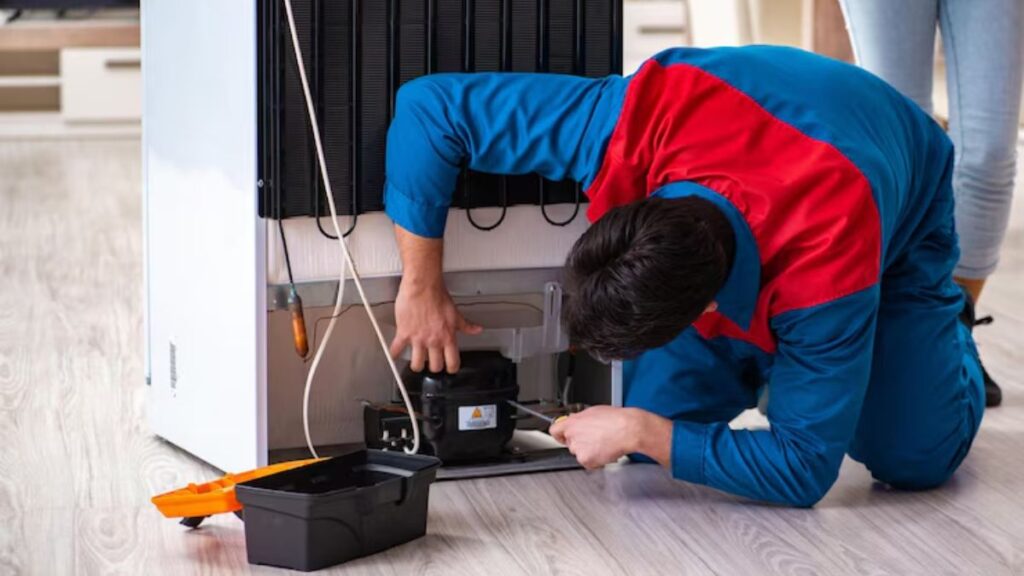The air in the fridge is cooled because the compressor drives the refrigerant through the coils, helping to chill the food. Once your fridge breaks down, you will have shelves full of wasted food and a bill for using extra power to cool your house. If the issue is noticed early, solved, and the right action is taken, the fridge’s life can be saved. In this article, you will learn how to Refrigerator Compressor issues, check for problems, and determine the proper method to resolve them, along with helpful lists.
Warning Signs of a Compressor on the Brink
If you keep a close eye on your home, you will easily spot compressor issues. If the fridge is not working properly, food may spoil because the temperature could be above 0-5°C. Look out for possible hums, clicks, or grinding sounds in the area where the compressor is located. If the space appears warmer than normal, the unit may be overworked. Other clues include the compressor running without a break, tripping the breaker, or a sudden jump in electricity costs from poor efficiency. Watch for these red flags:
- Food warming up in the fridge or freezer.
- Humming, clicking, or grinding sounds from the rear.
- Excessive heat around the compressor.
- Constant running or electrical trips.
Acting fast on these signs can save you from a bigger mess, like a fridge full of ruined groceries.
Why You Need a Pro for Compressor Repairs
Fixing a refrigerator’s compressor requires specialized skills, not just simple weekend work. Some refrigerants involved and the electrical equipment used are hazardous, making the system risky if handled incorrectly. Superior Appliance Service and other professionals in Ontario can properly address leaks and often replace parts, including relays, capacitors, and compressors. They must obey specific rules and focus on avoiding accidents because refrigerant is harmful to the planet. It is not safe to attempt to repair the fridge yourself, as you risk damaging your device and invalidating your warranty. A professional gives you peace of mind by offering important assurances.
Pinpointing the Problem: Diagnostic Steps
Figuring out what’s wrong with a refrigerator compressor takes a methodical approach, like any good technician would use. Start by listening to the unit. A clicking noise often points to a bad start relay, while a steady hum might mean worn-out internal parts. Check if the compressor starts up or just runs endlessly—both are trouble signs. For a deeper look, unplug the fridge for safety, pop off the back panel, and grab a multimeter. Test the compressor’s terminals for continuity; if the readings are off the manufacturer’s specs or show a ground fault, the compressor’s likely shot. Peek at the condenser coils, usually under or behind the fridge, for dust or grime that could be stressing the system. Give the start relay a shake—if it rattles, it’s done. Make sure the condenser fan spins smoothly, as a jammed fan can overheat the compressor. Key diagnostic steps:
- Ear on for clicks, hums, or grinding noises.
- Check compressor continuity with a multimeter.
- Look for dust clogging the condenser coils.
- Test the start relay and fan for proper operation.
If these checks don’t solve the puzzle, you might be dealing with a refrigerant leak, which needs specialized gear to diagnose.
What’s Behind Compressor Trouble?
Compressor issues often come from a handful of culprits. Electrical glitches, like voltage spikes or unstable power, can burn out the start relay or capacitor. Dusty condenser coils trap heat, forcing the compressor to work harder than it should. A busted start relay or capacitor keeps the compressor from starting, while worn bearings inside cause noise or total failure. Low or leaking refrigerant throws off the cooling balance, putting extra strain on the system. Poor airflow, especially in tight spaces, can also cook the compressor over time. Vacuuming the coils every six months and keeping the fridge’s surroundings clear can prevent most of these headaches.
Fix It or Swap It: Making the Call
You can either repair something or exchange it for something different. The decision between fixing and replacing a broken compressor depends on some practical points. Repairing a refrigerator compressor typically costs between $300 and $650, depending on the brand and age of your fridge.It may be worth repairing the compressor on appliances less than 10 years old, especially if they have features like ice dispensers and the warranty covers 5 to 10 years. In such cases, it is better to replace the old fridge with a modern one for around $1,200, as these cost less to run on power. If additional parts, such as the evaporator or control board, are also damaged, the price to repair them might become higher than the cost to replace the entire unit.
- Fridge’s age: Fix newer units; replace older ones.
- Cost check: Compare repair ($300-$650) to a new fridge ($1,200).
- Warranty coverage: Look for active compressor warranties.
- Power savings: Newer models are more efficient.
Repairing a premium fridge keeps its value, but an old, glitchy unit is often better replaced.
Keeping Your Compressor in Check
Stopping refrigerator compressor problems before they start comes down to basic care. Every six months, clean the condenser coils with a vacuum or soft brush to keep heat moving out smoothly. Leave 5-10 cm of space around the fridge for proper airflow. Don’t cram the fridge too full—it makes the compressor work overtime. Check the door seals now and then to block warm air leaks. A yearly professional checkup can catch issues like low refrigerant early, saving you from bigger repairs.
When to Call for Backup
Should regular maintenance and resetting the fridge not help, you should look for “refrigerator repair near me” in Ontario. When you bring in a technician, difficult issues like leaks from the air conditioning system or electrical failures can be resolved to keep your food preserved and prevent further harm. Rapid attention to your fridge can help prevent food spoilage and damage to the appliance.
In summary, handling refrigerator compressor issues means catching early warning signs like warm food or strange noises, running careful diagnostics, and choosing between repair or replacement. A professional fridge compressor repair service ensures safe, reliable fixes, while regular upkeep prevents future trouble. Acting promptly with expert help keeps your fridge running smoothly, protecting your food and your wallet.







